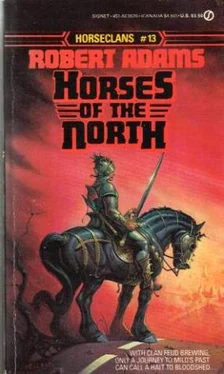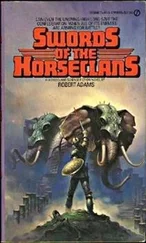What issued from Gerald Falconer’s mouth during the next three-quarters of an hour was not a sermon. He ranted, he raved like a frothing lunatic on the disloyalties of parishioners, children and other relatives. He damned every prairie rover ever born orspawned, laying upon them the full blame for every ill that had afflicted the station in the last fifty years. At last, when he had worked part of the frustration and rage out of himself, he paused for a long moment to catch breath.
Then he bespoke his wife. “You get out of here now, and take the children with you. Have my dinner ready in an hour. I needs must have words with Emmett here.”
For all that Jane Falconer had been Gerald’s wife for over ten years, she still was a young woman—not yet twenty-six—and not even his years of browbeating had worn her down, any more than identical treatment had broken the spirit of his daughter by his deceased first wife. She and Megan had, indeed, thoroughly discussed in secluded whispers the girl’s decision to quit the house of her overbearing father and seek a chance of happiness in the nomad camp. She had thought to remain with the husband whom so many had already deserted, not through any sense of love or duty, but because she had felt pity for him. But after today’s diatribe, she now entertained serious doubts as to his mental and emotional balance and the wisdom of her and her tiny children’s remaining in proximity to him.
She did go home, but she remained only long enough to get together her clothing and that of her children, her Bible and a few especially treasured kitchen utensils. With everything packed in the garden wheelbarrow, her youngest child perched atop the load, she led the other two in the direction of the camp of the nomads.
“It must be done in front of as many of our people as is possible,” averred the Reverend Gerald Falconer. “I leave it to you two as to how to assemble them. Lie, if you must. God will forgive you, for it’s being done in His Holy Name.
“When we have them and him there, I will advance upon him and offer him the silver cross, demand that he hold it in his hand, kiss it and bow knee to me. He will, of course, recoil in horror and loathing from the sacred cross, and that will be your signal, Emmett, You must then bring out the pistol and place that silver bullet as close to his foul heart as you can, praying hard that God Almighty will guide your eye and hand.
“I will not, of course, be bearing any weapons, but Grant will have a rifle, and—”
“But … but Reverend Falconer,” protested Grant MacEvedy anxiously. “I … I don’t know anything about shooting rifles. Besides, the noise is so loud that it gives me headaches for days afterward, sometimes.”
“All right, all right,” snapped Falconer shortly. “Get yourself a hunter’s crossbow, then. That ought to be noiseless and simple enough for even you at the short distance you will be from your father and me. All you have to do is put your bolt in anyone who makes to prevent your father from shooting the Beast. Do you think yourself capable of protecting your own dear father, boy?”
Grant MacEvedy left the chapel meeting and repaired to the empty, echoing, now-dusty house that he shared with his father. MacEvedy pere had, in better times, been a hunter and owned the usual collection of hunting weapons, clothing and equipment.
Grant was not and had never been a hunter. He ate game, just as he ate domestic animals, but he had never even thought of killing his own food, for it was just so terribly messy a job. He had always insisted that his meat of any kind be cooked completely through, for the sight—indeed sometimes even the mere thought—of blood could render his delicate stomach unable to hold food of any type for some little time. Besides, hunting as practiced by fort or station people had always included dogs—before the folk had had to eat them, the cats and even the rats and mice—and close proximity to any furred animal had always set Grant to sneezing, wheezing and coughing, his eyes so red and swollen and teary that he could not see clearly.
Because of Grant’s utter inexperience in the use of and his complete unfamiliarity with the construction and appearance of weapons—to him, all of the prodds and crossbows closely resembled each other—it were perhaps charitable to forgive the born blunderer his grievous error in arming himself for the imminent confrontation into which he had been most unwillingly dragooned.
After all, every person or other living thing that he had ever seen shot at and hit with a fired bullet or a loosed arrow or quarrel bolt or a prodd-pellet had immediately fallen, either dead or mortally wounded. Therefore, the young man had a much-overinflated faith in the never-failing efficacy of all firearms and other missile weapons. He did not for one single minute doubt that immediately his father blasted the holy silver bullet into the breast of the werebeast, Moray, the sinister, unnatural creature would curl up and die, thus proving for once and always to all and sundry of the misled, mutinous people that Director MacEvedy and the Reverend Mr. Falconer had been right all along.
He seriously doubted that he ever would have to actually make use of the heavy, clumsy, terribly dusty weapon he finally chose, but he always had obeyed his father, and his father had instructed him to cooperate in every way with the Reverend Gerald Falconer.
He left the room that housed the director’s modest arsenal with a medium-weight crossbow and a belt pouch of quarrels, just as he had been bidden to do. However, that device which he took for a crossbow, because of very similar shape, was actually a double-stringed prodd or stone-thrower, while the pouch of quarrel shafts—which, of course, he had not bothered to check, nor likely would have known for what differences to look, had he checked—were tipped with smooth, blunt horn heads and were intended for use in a lighter, one-stringed weapon when hunting birds or rabbits.
After severely skinning the knuckles of his butter-soft hands while trying to operate the built-in cocking lever of his chosen weapon, Grant brushed away his tears, blew his sniffly nose twice, then carefully washed off the scrapes before donning a pair of pliable doeskin gloves, lest he be again so injured.
Next came the problem of concealing the fact that he now was armed. The pouch of quarrel bolts presented no difficulty; he simply allowed his shirttail to dangle down untucked, as he often did in hot weather. But the awkward and, to him, ill-balanced prodd was something else again. At last, despairing of really effective concealment, he wrapped the ill-shaped weapon in a rain cape and took it under his arm, still uncocked. Then he left the house and set off for the chapel, whence all three of them—Director Emmett MacEvedy, the Reverend Gerald Falconer and he—were to set off together for the fateful confrontation with the Satanic beast and the God-sanctioned, fore-ordained successful conclusion of their deadly purpose.
Soon, very, very soon, Grant assured himself, everything in the fort and the station would be just as it had always been. At the orders of the director, the reverend and himself, the people would join together to kill or to drive off the dirty, smelly, godless, heathen, prairie rovers—keeping their cattle and sheep and goats and horses, of course. Then, with proper order again restored, he and his father and the reverend would firmly reestablish their God-given sway over the deeply repentant insubordinate subordinates. Personally, he, Grant, relished his thoughts of making the faithless folk of station and fort squirm for many a year to come as he hashed and rehashed the tale of their faithlessness and gullibility to the wiles of Satan.
As for the arrogant, violent and often—to Grant—frightening Colonel Ian Lindsay, he would be utterly discredited for all time, and whenever Pa died and Grant, himself, became director …
Читать дальше












